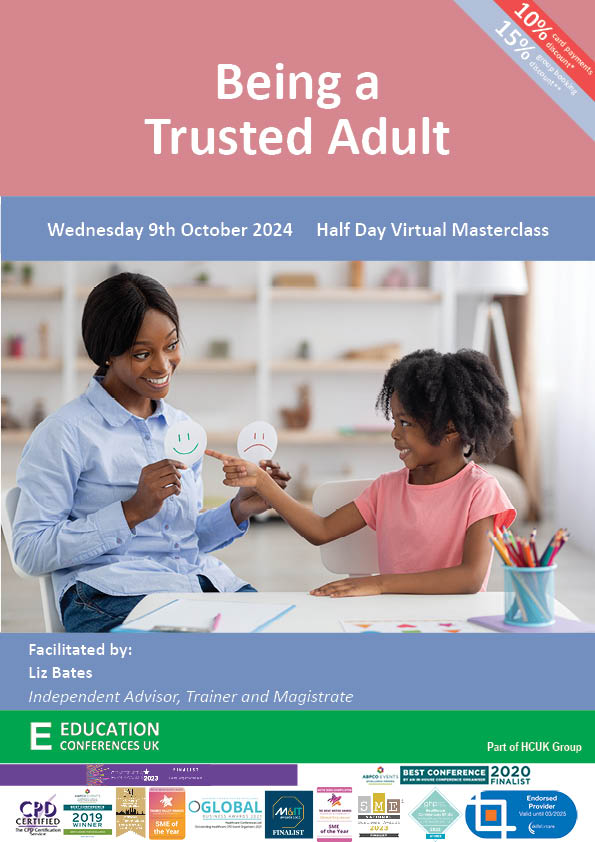This half day masterclass will give you the time and the space to consider perhaps the most important role in school, and one which we all share. We cannot and should not expect children to trust adults in school simply because they are adults, and for some children this trust may not be easy, automatic or obvious. We must always keep in mind that as much as you may want or need to be that trusted adult, it will be the child who decides.
“Safeguarding is everyone’s responsibility... anyone working with children should see and speak to the child; listen to what they say; take their views seriously...”
Working Together to Safeguard Children.
The role of the trusted adult is recognised as being a key element of safeguarding. Keeping Children Safe in Education and Working Together to Safeguard Children are clear in the remit of a ‘person in a position of trust’ - the actions and behaviours expected, and legally identifiable responses to children. We all understand how important this is and how it impacts on our roles in school. However we also use the term ‘trusted adult’ to describe our relationship with children in our settings, above and beyond safeguarding. But how much do we interrogate what it means to be a trusted adult? The role of trusted adult is predicated on demonstrating and evidencing reliability, consistency, and constancy. We may have to ‘prove’ our fidelity on a regular basis.
This masterclass explores the importance of being explicit in our connectedness, mind-mindedness and empathy and will include strategies and tools to explore what we as adults can do to better understand what being a trusted adult means both for us and for the child.
KEY LEARNING OBJECTIVES
This Masterclass will enable you to:
Consider the all-encompassing remit of being a trusted adult
Reflect on being the ‘decisive element’ in the room
Consider the right to feel safe, persistence, rule-breaking and a 5-step approach to supporting disclosure
Interrogate the language of safety
Look at strategies and tools to enhance our role and increase children’s levels of trust
WHO SHOULD ATTEND
All staff but particularly, DSL teams, Pastoral teams, the designated teacher for looked-after or previously looked-after children and Learning support teams.
FACILITATOR
After working in schools for over 25 years, as a teacher and senior leader, Liz then worked as an advisor for Birmingham Local Authority and later with an educational charity for 10 years. As well as leading on Mental Health, Emotional Health and Wellbeing, Liz advised schools and other organisations in all aspects of Safeguarding.
Liz now works as an independent advisor working with schools and other organisations in a number of ways, such as training staff and auditing wellbeing. She has delivered presentations, workshops and research findings at national conferences. Liz is the author of 8 books, teaching sets and resources that are used across the country and internationally by schools and by other professionals working with children and has written for a number of professional journals such as ‘The Psychologist’ and the TES.
Liz has worked for the Anna Freud Centre and also works as a Wellbeing Award advisor and verifier for Optimus Education. Liz is a member of the Attachment Research Community (ARC) and a Protective Behaviours associate practitioner and trainer. Liz also sits as a Magistrate in the Family Court.



